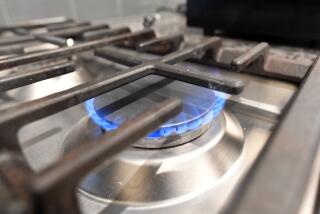Health Trade-Off Surfaces in New Arco ‘Cleanest’ Gas
- Share via
Confidential testing of Arco’s newly reformulated premium unleaded gasoline indicates it produces a 34% increase in emissions of a suspected cancer-causing agent, but scientists said Monday that the fuel’s overall benefits to clean air and health are worth the trade-off.
The scientists said that even though emissions of 1,3-butadiene, the suspected cancer-causing agent, had increased, the concentrations remained too small to pose a health threat.
When Arco announced its new formula on Sept. 6, it called the fuel, EC-Premium, the “cleanest-burning” gasoline available in Southern California.
Environmentalists became concerned after obtaining previously undisclosed results of Arco’s testing of the reformulated unleaded gasoline. Compared to conventional unleaded premium, Arco had said the new fuel reduced emissions of cancer-causing benzene by 36%, carbon monoxide by 28%, and smog-forming hydrocarbons by 21%.
The company made no mention of the 34% increase in emissions of 1,3-butadiene and a possible 9.8% increase in smog-forming nitrogen oxides.
On Monday, Arco confirmed the butadiene results but said the 9.8% nitrogen oxide increase was based on unreliable data. Butadiene, used in manufacturing some rubber, is a toxic component of tailpipe emissions that is considered less threatening to health than benzene.
The concerns raised by environmentalists come as the oil industry is engaged in a crash program to develop cleaner-burning gasolines in the face of growing pressures for alternative energy sources such as methanol, ethanol and electricity.
Although one environmentalist said 1,3-butadiene was “of very high concern,” independent scientists minimized the threat.
Scientists at the Lovelace Inhalation and Toxicology Research Institute in Albuquerque, N.M., and the Health Effects Institute in Cambridge, Mass., said that even with a 34% increase, the concentrations were too small to be significant.
Emissions of 1,3-butadiene from EC-Premium were measured at 3.3 milligrams per mile, compared to 2.5 milligrams per mile for conventional unleaded premium.
“I don’t personally think (the emissions are) anything to worry about. I think we’re buying a lot more by reducing the benzene and the carbon monoxide and hydrocarbons,” said Rogene Henderson, an inhalation toxicologist at the Lovelace Institute, which conducts tests for the U.S. Department of Energy.
“If I were looking at the whole picture, I’d say the trade-off was worth it,” she said.
Dan Townsend, manager of Arco’s clean fuels task force, said that despite the increase in butadiene, EC-Premium reduces pollutants overall.
“While the butadiene is up, all of the other toxics are down enough that the overall cancer risk is down by 28%,” Townsend said.
More to Read
Inside the business of entertainment
The Wide Shot brings you news, analysis and insights on everything from streaming wars to production — and what it all means for the future.
You may occasionally receive promotional content from the Los Angeles Times.









